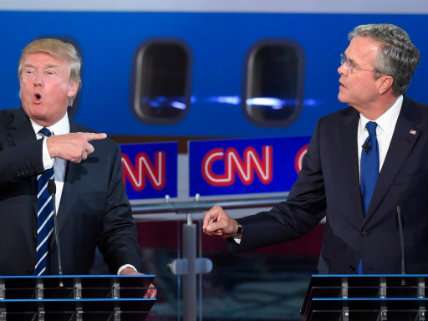The GOP Primary Race Demonstrates How Little Republicans Care About Governance
Trump has turned his lack of political experience into a virtue.

One striking lesson of the 2016 GOP primary race so far is how little governance seems to matter. Indeed, proven experience crafting, passing, and implementing policy increasingly looks like a liability in the Republican race.
Donald Trump, who has never held elected office and seems to regard policy mainly for its expressive value, leads the race by a significant margin. Ben Carson, a neurosurgeon who also has also never held political office before, has fallen to last place in the polls, but is also the only candidate in the race to ever come close to equaling Trump's standing in national polling.
The two most likely candidates to beat Trump, Ted Cruz and Marco Rubio, are first-term senators with little in the way of legislative achievement. Indeed, Rubio now says his most prominent legislative initiative, the immigration reform plan he co-sponsored as part of the gang of eight, was never even intended to pass. Cruz's most significant act as senator, meanwhile, was an act of anti-governance, when he rallied Republicans around a doomed plan to stop Obamacare by shutting down the government.
All of the GOP governors in the race—Scott Walker, Rick Perry, Bobby Jindal, Chris Christie, and Jeb Bush—have dropped out save for one, Ohio Gov. John Kasich, who has little to no path to the nomination. Kasich's supporters, meanwhile, are running ads that explicitly downplay policy and governing experience in favor of an emotional appeal. The first line spoken in the new ad, "The Hug," put together by a pro-Kasich Super, is, "Being president is more than the economy or health care." The ad centers on a moment in which Kasich hugged an emotionally bereft supporter at a campaign event, and pitches Kasich as someone who could figuratively embrace the nation in the same way—not as an executive, but as a hugger in chief.
Out of all of the GOP candidates, Trump has taken this approach the furthest. He argues that his utter lack of connection to or experience with the political system is what will help him reshape it. In effect, he has made his lack of political experience or policy knowledge into a virtue.
It is often true in elections that governance and legislative records play secondary roles. And Democrats are not exactly celebrating candidates with long records of governing or policy success; neither Bernie Sanders nor Hillary Clinton are particularly known for their major legislative achievements, and the one governor who entered the race, Maryland's Martin O'Malley, barely made a blip.
But the disregard for governance and legislative effectiveness is most evident on the GOP side of the aisle, and in the campaign of its frontrunner: What Trump's success has made clear is that for many GOP voters, governance is not just a non-factor, it is a liability.


Show Comments (154)